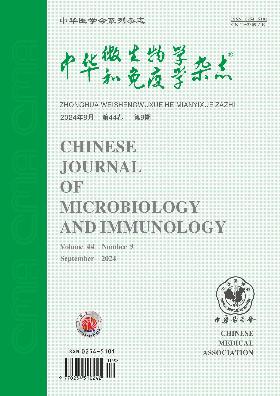Research of simvastatin-induced autophagy in inhibiting recombinant human metapneumovirus replication
Q4 Immunology and Microbiology
引用次数: 0
Abstract
Objective To study whether simvastatin could inhibit viral replication during human metapneumovirus (hMPV) infection. Methods Human bronchial epithelial cells (16HBE) were infected with hMPV and then treated with or without simvastatin. Real-time quantitative PCR (qPCR) and Western blot were used to detect virus titers and the activation of autophagy and related pathways. BALB/c mice were infected with hMPV and then treated with simvastatin through intragastric administration. Pathological changes in lung tissues were observed. Changes in viral loads and the activation of autophagy and related pathways in proteins and RNA extracted from lung tissues were detected. Results The in vitro experiment showed that the hMPV+ simvastatin group had decreased virus titer and enhanced autophagy than the hMPV group. The AKT/mTOR pathway in the hMPV+ simvastatin group was inhibited, which was verified by a further experiment using rapamycin, a specific inhibitor of AKT/mTOR pathway. The in vivo experiment showed that the virus titer in the hMPV+ simvastatin group was lower than that in the hMPV group, but there was no significant difference in the activation of autophagy. The AKT/mTOR pathway was down-regulated in the hMPV+ simvastatin group. HE staining revealed that obvious pathological changes were observed in the hMPV group, but the condition was improved after simvastatin intervention. Conclusions Simvastatin can inhibit the replication of hMPV, which is associated with the activation of autophagy induced by AKT/mTOR pathway. Key words: Human metapneumovirus; Simvastatin; Autophagy; AKT/mTOR辛伐他汀诱导的自噬抑制重组人偏肺病毒复制的研究
目的研究辛伐他汀对人偏肺病毒(hMPV)感染过程中病毒复制的抑制作用。方法将hMPV感染的人支气管上皮细胞(16HBE)分别给予辛伐他汀或不给予辛伐他汀治疗。采用实时荧光定量PCR (Real-time quantitative PCR, qPCR)和Western blot检测病毒滴度和自噬激活情况及相关途径。BALB/c小鼠感染hMPV后,经灌胃给予辛伐他汀治疗。观察肺组织病理改变。检测肺组织中提取的蛋白质和RNA中病毒载量的变化、自噬激活及相关途径的变化。结果体外实验显示,与hMPV组相比,hMPV+辛伐他汀组病毒滴度降低,自噬增强。hMPV+辛伐他汀组的AKT/mTOR通路受到抑制,进一步的实验使用AKT/mTOR通路特异性抑制剂雷帕霉素证实了这一点。体内实验显示,hMPV+辛伐他汀组的病毒滴度低于hMPV组,但在自噬激活方面无显著差异。hMPV+辛伐他汀组AKT/mTOR通路下调。HE染色显示hMPV组有明显的病理改变,经辛伐他汀干预后病情好转。结论辛伐他汀可抑制hMPV的复制,这与AKT/mTOR通路诱导的自噬激活有关。关键词:人偏肺病毒;辛伐他汀;自噬;一种蛋白激酶/ mTOR
本文章由计算机程序翻译,如有差异,请以英文原文为准。
求助全文
约1分钟内获得全文
求助全文
来源期刊

中华微生物学和免疫学杂志
Immunology and Microbiology-Virology
CiteScore
0.50
自引率
0.00%
发文量
6906
期刊介绍:
Chinese Journal of Microbiology and Immunology established in 1981. It is one of the series of journal sponsored by Chinese Medical Association. The aim of this journal is to spread and exchange the scientific achievements and practical experience in order to promote the development of medical microbiology and immunology. Its main contents comprise academic thesis, brief reports, reviews, summaries, news of meetings, book reviews and trends of home and abroad in this field. The distinguishing feature of the journal is to give the priority to the reports on the research of basic theory, and take account of the reports on clinical and practical skills.
 求助内容:
求助内容: 应助结果提醒方式:
应助结果提醒方式:


